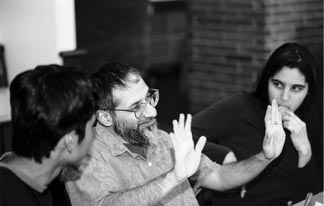Students go around the world in 8 days with Shawkat Toorawa
By Franklin Crawford

Say you were to go around the world in eight days. What would you need? Well, a map, for sure. A good tour guide might help. For the past five years Cornell University students who have attended "Around the World in 8 Days with Shawkat M. Toorawa" have had just that: a walking, talking GPS -- that is, a global positioning scholar of seemingly boundless energy.
Toorawa is an assistant professor of Arabic literature and Islamic studies, and director of graduate studies, in the Department of Near Eastern Studies. He is also a faculty fellow at Robert Purcell Community Center, where he holds fortnightly dinners for his students, along with his wife, Parvine, and his two daughters, Maryam and Asiya. And, once a month, he takes students on a "trip" to places as far-flung as the Waqwaq Islands in the Indian Ocean, or to the Republic of Georgia, or as strangely familiar (for some) as Fire Island, N.Y. This year the students are spending "eight days" in Africa, traveling with Toorawa to Mali, Tunisia and Burkina Faso.
The Around the World program -- and the dinners -- have played an important part in the informal learning process for dozens of Cornell students. It has done something else as well.
"Through his dinners and his unusual program, he helped to create a community where there wasn't one before," said Zahra Aziz, English '04, who counts the Toorawa dinners and programs as a big part of her Cornell experience. "Before he came, the Muslim community on campus was pretty scattered. But once he was here, he developed events and programs that brought us together. We loved Dr. Toorawa."
Not that the dinners and programs are exclusive to one group. Toorawa says about half the students who come are Muslim, but the ever-changing group as a whole is indefinable. "Because I am Muslim, there is a certain Muslim constituency," said Toorawa, who joined the Cornell faculty in 2000. "But at each dinner or program, the students get to meet people they wouldn't otherwise meet and new conversations are constantly developing. It's always a diverse group who come for diverse reasons."
Toorawa said Around the World began as a monthly lecture series but naturally evolved into more of a film and discussion series to keep it from becoming "like taking a class." A play on the novel "Around the World in 80 Days," the eight refers to the number of months in the academic calendar.
Whenever he can, Toorawa enhances the program with appearances by visiting scholars and artists. In 2001, Omid Safi of Colgate University gave a talk titled "From Persian Saint to American Icon: The Post-Death Career of Rumi." Others guests have included Simon Shaheen, world-renowned master of the oud and violin; award-winning Canadian novelist Moyez Vassanji ("The In-Between World of Vikram Lall"), who read from his work; and Marc Ostfield, an international health expert who gave a talk titled "Fire Island: Community Identity and Politics on a Barrier Island." He has even "time-traveled" with students, using the movie "Blade Runner" to take a trip to Los Angeles in 2019, with guest speaker and filmmaker Demir Barlas, Near Eastern Studies '95. That event was co-sponsored by the Cornell Science Fiction Society. All of Toorawa's events are co-sponsored by Near Eastern Studies, a department he says values interaction with students outside the classroom.
Toorawa keeps a head count on attendance at the program and rarely has it dipped below 10. He credits this to the excellent job Campus Life graphic artist Jeanne Butler does with the posters and advertising.
"Shawkat puts a lot of energy into his programming," said Leslie Sadler, assistant director for faculty and special programs. "And the student exchanges he generates just make for a great informal learning experience."
In 2004, as an alternative to Slope Day, Toorawa used his program to screen three films, "The Last Temptation of Christ," "Dogma" and "Jesus Christ Superstar." The preceding year he showed the documentary "What Arabs Think," plus "Buckaroo Banzai Across the Eighth Dimension" and the Hindustani classic "Shree 420."
"They were actually pretty well attended, considering it was Slope Day," he said, pleasantly surprised by the outcome of his experiment.
And for the 2003 student reading project on Mary Shelley's "Frankenstein," he showed the "Star Trek: Next Generation" episode "Lal," in which the character Data creates a child.
Now, what country would that be?
"The Alpha Quadrant!" says Toorawa.
While his energy is remarkable, Toorawa is really paying it forward from his own college experience. He lived in a college house themed around community service when he was at the University of Pennsylvania, and the informal contact with professors was, he said, "a very important part of my college experience."
Media Contact
Get Cornell news delivered right to your inbox.
Subscribe